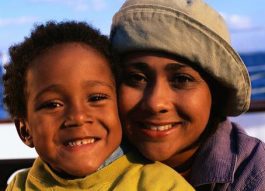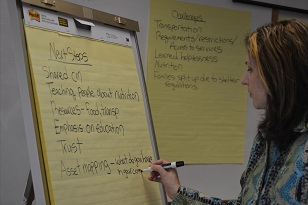Mental Health Counseling 
Our approach begins with a thorough assessment of the client’s needs, which takes into consideration the behavioral, emotional, physical, familial, social, and educational dimensions of a person’s life. We also assess and integrate the strengths of the individual client and their family, which provides a strong foundation for the client’s treatment plan. Building a partnership with the client, their caregiver (if the client is a child), and other community providers, enables us to create a measurable plan that addresses the unique needs of the client. Our evidence-based services, which incorporate strengths-based, empowerment-based, family systems, and ecological theories of practice, include:
- Trauma impact assessments
- Infant mental health services
- Trauma-focused therapy, using the latest evidence-based approaches
- Trauma-focused play therapy for children (ages 3 and older)
- Family therapy
- Parent support and training
- Collaboration and consultation to other service providers involved with the client
Parenting Support Services
We believe parents and caregivers are their children’s greatest teachers and our most important partner on the child’s treatment team. At Merrimack Valley Trauma Services, we directly involve caregivers (biological parents, kinship parents, foster parents, and relatives) in every aspect of their child’s treatment, as we know that healing from trauma occurs through the safe and loving relationships between caregivers and their children.
Many caregivers have their own trauma histories and struggle with mental health issues, substance abuse, and problems in relationships. Sometimes these struggles impact the way they parent their children. Our unique parent-focused services are customized to each caregiver’s strengths and needs. Through education, skills building, coaching, and support, we believe parents can experience personal healing, as well as promote healing within their family for generations to come.
MVTS Parenting Support Services brochure
MVTS Parenting Support Services brochure-SPANISH
Consultation and Training 
We offer the following consultation services:
- Strategies for creating proactive, safe, trauma-sensitive programs and school communities
- Ways to enhance a program’s existing mental health services and crisis management capacity
- Trauma-focused behavior management strategies for children
- Parenting support for caregivers who have, themselves, experienced trauma
- Individual and group licensed supervision
We also offer training services through small groups (one time or a training series), larger workshops, and conferences.
MVTS Consultation Training and Evaluation Services brochure
Safe Kids-Healthy
Families Program 
Safe Kids-Healthy Families Program is a program developed by Dianne Corbin, LISW-CP/S, CEIS, Executive Director, that serves children and their families impacted by sexual abuse. Since sexual abuse affects the entire family, not just the child or adolescent who was abused, this program focuses on first supporting caregivers (including parents, foster parents, kinship parents, and other family members), educating them about trauma, sexual abuse, the possible impact of their own trauma history on their parenting, positive communication, and trauma-sensitive discipline strategies. A separate curriculum works intensively with caregivers who have a child, ages 3-12 years, who has sexual behavior problems. The program then provides the opportunity for family sessions involving the child who was abused or suspected to be abused and siblings (when appropriate), helping caregivers lead the sessions and teach children important skills about safety and prevention.
Trauma Evaluations*
*Offered in South Carolina only
Merrimack Valley Trauma Services (MVTS) offers comprehensive, forensically sound, trauma evaluations for children and adolescents (ages 4 to 18 years). A trauma evaluation provides a neutral, non-judgmental environment in which the child can report any incident(s) of trauma he/she has observed or any incident(s) in which he/she has been a participant. Evaluators are specifically trained to be non-directive, in order to minimize our impact on the credibility and validity of the information reported by the child, and use forensically-sound, developmentally appropriate assessment and interview techniques, based on the Guidelines for the Clinical Evaluation for Child and Adolescent Sexual Abuse (American Academy of Child and Adolescent Psychiatry) and components from the National Institute of Child Health and Human Development (NICHD) Investigative Interview and Protocol.